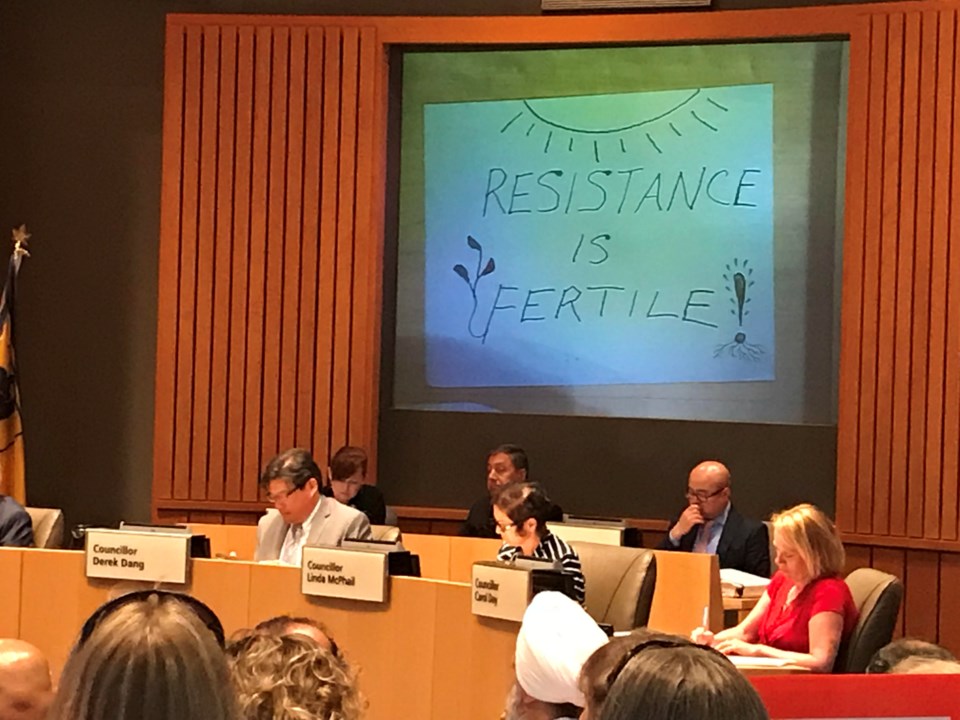It was the second council meeting this year to draw more than 30 delegations speaking on the issue of home sizes on Richmond’s agricultural land reserve. This time, however, the discussion went past midnight.
Early on in the evening, one delegation doubted Monday’s lengthy discussion would make much of a difference.
“There's not much that's going to be said tonight that's going to change anybody's mind,” he said.
In fact, after nearly four hours of feedback from delegations and more than an hour of discussion by council, the decision was made to keep the status quo on home sizes on the ALR. The only new addition was to allow a secondary dwelling on ALR property.
Previously, city staff had recommended 12 options for maximum farm house sizes to councillors, ranging from 5,382 to 10,764 sq. ft. After Monday night's discussion, all councillors voted to strike down city staff’s Option 5A, which was previously supported at last week’s general purposes committee meeting. This option would have kept the square footage the same, but would have reduced the home plate, forcing larger homes to increase the number of floors they had.
After this, Coun. Harold Steves put forward a motion to adopt staff’s Option 1, which would limit home sizes to 5,382 square feet. The motion was defeated, however, with Couns. Carol Day, Steves and Mayor Brodie the only three in support of it.
Council moved on to vote on the matter of a secondary dwelling which passed, with the same three opposed.
Before the votes, Mayor Malcolm Brodie spoke passionately about why he believed reducing home sizes was important.
“If anyone thinks that the whole quality of the agricultural land reserve isn’t being fundamentally changed by what is going on the residential side of it, if you think it’s not changing, then I think you’re from another planet,” Brodie said.
“I think this is a serious mistake. Our role is to do what is best in the interest of all the residents and businesses here in Richmond…if we don’t improve the situation as has been mentioned, I think we are doing a terrible disservice to the city of Richmond.
“We’ll come back here in a few years and there will be these estate houses everywhere. And that will be the end of it.”
Most residents who spoke during the meeting were disappointed that the discussion was back at council at all, after the issue was sent back to city staff in March.
“I believe that we have reached a very sad day when politicians blatantly ignore the wants of their constituents to feather the nests of big donors and lobbyists. Unfortunately, that day has arrived in Richmond,” Jack Trovato, a Richmond resident who had hoped to see home sizes restricted further said to council.
“Shamelessly this council has dragged their feet in refusing to sign the moratorium aimed at prohibiting foreign investors and speculators from stealing and pillaging our most fertile farmland.
“Of course, what is at stake is the welfare and the food security of not just Richmond but of B.C.”
For Peter Dhillon, chair of the Ocean Spray board of directors and president and CEO of the Richmond-based Richberry Group of Companies, the fact that home sizes were discussed for so long was “upsetting.”
“Richmond is falling behind. We’re playing catch-up…every time you put these restrictions on us you hurt our ability to reinvest,” he said to council.
Dhillon felt that farmers were neglected throughout the lengthy debate.
“If you want us to keep farming then please have the discussion with farmers,” he said
“Very disappointing. A lot of people here are talking tonight, who is actually talking to the farmers. That is the concern.”
Amar Singh, whose family of 16 lives together in one house and runs a blueberry farm, was pleased about the outcome of the meeting. But he also echoed the frustrations over the issue needing to be discussed at all.
“Ultimately I’m glad with the result,” he said. “It is frustrating though, to an extent, just how long this process has been.”
For John Roston, Richmond resident and supporter of smaller house limits, the results of the council meeting were disappointing, but not a shock.
“It’s what we thought,” he said. “That’s what we were expecting.”
Now, Roston says he will take redirect his fight elsewhere.
“Aside from being disappointed, the real point is now turning it over to the province,” he said.



